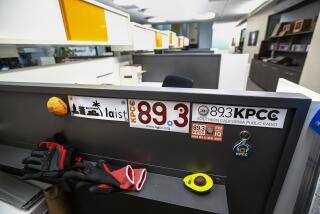Buyout Talk in Newspaper Strike
SEATTLE â As this cityâs newspaper strike entered its second day Wednesday, a major news organization said it had offered to buy all of the Seattle Times that it does not already own, saying it was poorly run.
Frustrated with subpar profits at the Times, Knight-Ridder Inc., which owns a 49.5% stake in the paper, has offered repeatedly to buy the founding Blethen familyâs 50.5% controlling stake, Knight-Ridder spokesman Polk Laffoon said.
He said the returns for Knight-Ridderâs investment in the Seattle Times âhave been extremely low relative to what they could and should be in the industry we are in.â
âKnight-Ridder runs better newspapers, both editorially and from a business standpoint, by far, than the Seattle Times,â Laffoon told Reuters, citing the Miami Herald, Philadelphia Inquirer and the San Jose Mercury-News.
Times owners, led by the Blethen family, which still controls the 104-year-old paper, refused to sell and publisher Frank Blethen recently sent a memo to workers saying the paper valued quality over profits.
Times spokeswoman Kerry Coughlin defended the paperâs editorial performance, citing its seven Pulitzer Prizes and other awards. âIf you look at our list of awards over the last decade, it is phenomenal,â Coughlin said. âAcross our class, we are exceptional.â
About 1,000 editorial and clerical workers at the Times and rival, Hearst. Corp.-owned Seattle Post-Intelligencer walked off the job at 12:01 a.m. local time Tuesday after negotiators failed to reach an agreement on wages, the key issue in contract talks.
Managers and nonunion employees, bolstered by a handful of replacement workers, put out shrunken 24-page editions of both papers, which work under a joint operating agreement, and handed them out free Wednesday.
The Times has increased its circulation lead over the Post-Intelligencer since switching from afternoon editions to morning earlier this year.
Some labor experts are predicting a lengthy strike and have speculated that one or both papers might have other competitive goals in mind.
âMy gut tells me there is more going on than is appearing on the surface,â said University of Washington political science professor David Olson.
âWhen the Times moved to a morning format, the die was set for some kind of clash down the line, whether that meant one of the papers would go under, consolidation of ownership or a reduction of employees,â Olson said.
Newspaper officials denied any ulterior motive, with both companies saying they hoped for a speedy resolution to the strike, Seattleâs first newspaper strike in nearly half a century. Laffoon also denied that Knight-Ridder sought to consolidate the Seattle market, despite the merger or failure of many papers in smaller U.S. cities in recent years.
âCincinnati supports two newspapers and Iâm sure Seattle can,â Laffoon said, though he noted: âIf only one company owned just one Seattle newspaper would it make more money? Yes.â
Laffoon added that the strike would have a ânegligibleâ impact on Knight-Ridderâs 2000 earnings, though a longer strike could affect 2001 profits.
The Post-Intelligencer has recruited nonunion replacement workers from its parent, Hearst Corp. and the Times has said it also would use replacement workers.
More to Read
Inside the business of entertainment
The Wide Shot brings you news, analysis and insights on everything from streaming wars to production â and what it all means for the future.
You may occasionally receive promotional content from the Los Angeles Times.










